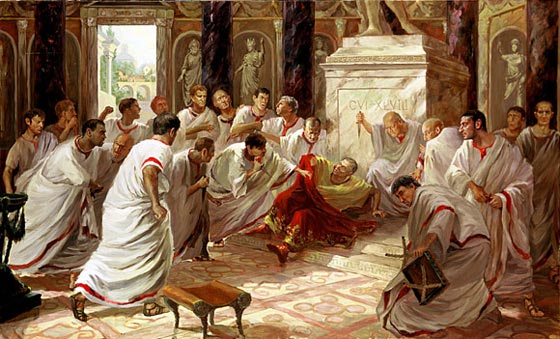|
I have a son that will “cut off his nose to spite his face”. One day, driving 3 of my 4 sons away from home for an outdoor adventure, my wife called. The missing son was wailing at the window. He’d desperately wanted to join us, to go out for some fun, but when I did not agree to all of his terms (he likes to bring “stuff” – tons of it, most that will be lost or destroyed), he adamantly refused to join us. I asked him if that was really what he wanted, and that we would be leaving shortly. He was resolute, even a little snarky. Okay, I said. I’m sad you won’t join us. We packed up, departed, and no sooner than we’d pulled out of the driveway, my little guy was beside himself, falling apart with regret. He was willing to lose the most important things in negotiations to achieve his particular vision for the day. This week, I started my unit on the fall of the Roman Republic. We learned about the origin myths of the Romans a few weeks back. Legendary Brutus (not the one who killed Caesar; his forebear), fed up with the abuses of the Tarquinian Kings, destroyed their power, and established the Republic as bulwark against future Tyranny. We Americans tell a similar origin story. King George III of England was a tyrant, and we overthrew his power and that of the British Empire. We tried the Articles of Confederation for a while, but those pesky young states couldn’t keep from harming one another and getting in each other’s business. Hmm. Anyhow, you know the story – the Constitution was drafted, and a great many checks and balances were inserted to keep any group or person from becoming too powerful. Like the Romans, we set ourselves up as a nation against Tyranny. So, this week, we started the unit in school where I tell the students about the Gracchi, progressive reformer brothers who wanted to raise the level of the Roman poor. Sounds nice. Unfortunately, they decided their cause was righteous enough they could change the rules, break with tradition, norms, and even the law. Later on we’ll talk about Sulla, who led the reaction against those progressive changes. He was the leader of a group derisively called the optimates “the best” by the progressives (populares). They wanted to take Rome back to its glory days, like, you know, Make Rome Great Again. Anyhow, long story short, the optimates and populares had a series of civil wars because both sides had heroes for leaders (the populares had Gaius Marius – a war hero who’d become consul despite not being part of the ruling Patrician clans) who put themselves above the law. Wait, you might be thinking, I thought tyranny was bad. What about King George III or Tarquinius Superbus (what a name)!? But, with Marius and Sulla, it was different, you know. They had a cause, a righteous one, and it was worth it to break with tradition to get their “platform” across, right? No. Marius and Sulla were responsible for thousands of deaths and hundreds of straight up murders. Sulla actually posted the names of people he didn’t like in the forum, and they were open game for bounty hunters. This amounted to government hit contracts on his political enemies. There were times when a visit to the Forum (sort of like the town square in Rome) meant you’d see heads on spikes while you were shopping for fresh produce. Ironically, Marius and Sulla did not die by the sword. The damage they’d done to the Republic was irreparable, though. A new generation of political supermen was coming. The famous orator Cicero ordered the execution of a man without trial. Another politician named Clodius waged a campaign of mob violence in the streets of Rome, assaulting and killing anyone who stood up to his policies. Everyone knows Julius Caesar. He had everything. Good looks, popularity and a family name to boot. Add to that he’d conquered the Gauls, an age-old enemy of Rome. He was at the top. He was also in debt, constantly, so he needed to stay in power. He was marching home with his army, and the leaders got nervous, and they reminded him of tradition. He thought that would lead to his demise, so he broke the rules and started another civil war. He won, and made himself dictator, first for ten years, and later, for life. Wait, that sounds like a tyrant? The descendent Brutus, surely obliged by his family tradition of resistance to tyranny, led the conspirators who stabbed Caesar to death. Problem solved, right? Nope. It was too late. Another civil war started. When I get to this part, my students moan about how ‘could those foolish Romans not see they were destroying themselves’ – yup. This time, however, the winner – who took the name Caesar Augustus (the nephew of Julius) – was smart. He pretended to honor tradition and gave the people bread and games. He also created a massive Praetorian Guard (think Secret Service, but with numbers like an army) who quietly eliminated anyone who spoke out. He hired the best writers, poets, playwrights, sculptors, etc. to portray him as hero and later, god. The idea of the Republic was dead, replaced by an Imperial Bureaucracy that was the embodiment of Tyranny. When I was a youngster, my parents put me in a bible study group called 2:7, based upon a passage in Saint Paul’s letter to the Colossians. It reads:
“Rooted and built up in Him, strengthened in the faith as you were taught, and overflowing with thankfulness.” I think the study was good, but only one thing sticks in my mind. We read this story called “The Tyranny of the Urgent”. It was an essay explaining how what we think is important at this moment becomes so powerful that it forces us to ignore those things that are most vital to our lives, notably our meditation on God – “rooted and built up in Him.” Lord, have mercy! I hate to write anything political, because I love people who disagree with me on a number of issues, right and left. I don’t want to wound them, and I don’t want to sever communication with brothers and sisters. I think we are in a dangerous time, though, and the watchman who doesn’t sound the alarm has blood on his hands. When I think of the Gracchi or Sulla, I think of politicians who were committed to their vision, to winning, at all costs. When I look at our political circus today, I see the same, and I’m worried and grieved. If what you’re fighting for requires you to ignore tradition, break the rules, turn to violence as an answer or secede, perhaps you’ve been wrangled by the “tyranny of the urgent”. The Late Roman Empire, the Holy Roman Empire, the Byzantine Empire, and the British Empire all had something in common. They believed that God was on their side. They’re all gone now, only history. We like to think America will last forever, that it is invincible because it is “under God”. Only if we are vigilant, if we have a clear focus on what is vital, and can also perceive what tyrannies are lies. Only if we are rooted and built up in the Author of all that is good, first and only.
0 Comments
Leave a Reply. |
"Examine all things; hold on to the good."
-Saint Paul the Apostle Archives
September 2022
Categories |


